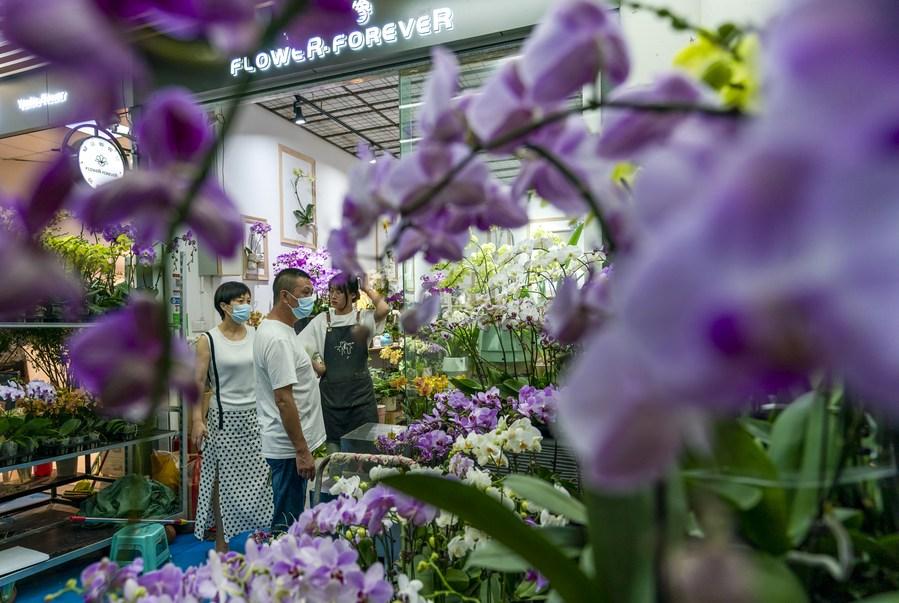A rendezvous with vibrant blooms in Asia's leading flower market
 0 Comment(s)
0 Comment(s) Print
Print E-mail Xinhua, August 15, 2023
E-mail Xinhua, August 15, 2023

People visit the Kunming Dounan Flower Market at night in southwest China's Yunnan Province, July 12, 2022. [Photo/Xinhua]
While many Chinese cities are currently experiencing scorching heat, the essence of spring lingers in the Dounan Flower Market in Kunming, southwest China's Yunnan Province.
An array of blossoms, including lotuses, roses and sunflowers, grace the scene here, ready to embark on a journey across the nation, adorning shopping malls, conference halls, wedding venues and the cozy corners of people's homes.
About 30 years ago, the Dounan Flower Market was just a street with roadside stalls selling flowers, but today it has become Asia's largest fresh-cut flower trading market. Its floral beauty reaches more than 40 countries and regions, with the export value hitting 520 million yuan (about 71.7 million U.S. dollars) in 2021, ranking first nationwide. Yunnan's fresh-cut flower growing area totaled 21,700 hectares in that year.
"This is a market for all people, where everyone can buy their favorite flowers at the lowest price," said Shi Jinlong, a seller hailing from the northwestern Shaanxi Province.
The Dounan market springs to life around 5 a.m. every day. Upon entering the bustling market, Shi starts his day by looking through the array of flowers brought by wholesalers and jotting down price details as he goes.
The wholesale trading session normally ends by 9 a.m. By then, retailers like Shi arrange their flowers at their stalls, waiting for buyers. A portion of Shi's flowers had been procured from wholesalers earlier, while the remaining were homegrown.
"When the business is good, around 600 bouquets could be sold in a day," Shi told Xinhua, adding that he has also involved his relatives in the flower industry.
"My sister sells flowers in the market during the day, my younger brother sells flowers through livestreaming on social media platforms like Douyin at night, and a few months back, my eldest brother traveled to Xinjiang to open a flower store. He imports all his flowers from Dounan. Each of us runs our own business and provides mutual assistance when needed," Shi said.
In addition to the Dounan flower market, people have the option to purchase flowers at the Kunming International Flora Auction Trading Center (KIFA), which stands as one of China's oldest and largest flower auction and trading hubs.
The reverberating sounds of trailer wheels started echoing across KIFA from 10 a.m., as meticulously bundled blooms were carefully stacked atop one another. These freshly harvested flowers, picked at the break of dawn, swiftly made their way to the trading center's warehouses for prompt distribution.
Retailer Zhang Lan has been a senior customer of KIFA for more than a decade. According to her, those participating in flower auctions must possess keen eyesight and swift reaction. "A second delay, and the transaction price changes."
The trading hall has 12 bells and a massive screen displaying pertinent details such as the flower's name, grade, maturity, defects and supply source during the auction.
During the Spring Festival holiday this year, 11.6 million flowers were sold here. According to Zhu Qi who is in charge of planning at the KIFA, the average daily volume of flower transactions reached 5 million last year.
"Before the flowers were auctioned, KIFA completed the process of pruning, packing, quality inspection, and information registration," Zhu said, adding that it usually takes less than 12 hours for the newly picked flowers to be put on shelves.
Packaging and logistics companies have branches in Dounan and they can ensure quick delivery of the consignments, said Zhang Lan who was waiting for her flowers to be delivered.
As the auction center closed at 8 p.m., the wholesale night market in the Dounan Flower Market came to life. E-commerce entrepreneurs flocked to the bustling scene, leveraging the power of the internet to attract customers through social media and online platforms like WeChat and Taobao.
Shi Jinlong and his wife tried livestreaming on Douyin in April and May last year. They were very happy to see their channel gain popularity but it was also quite exhausting. "We also had to pack until 2 a.m.," he said. After half a month, they gave up.
Nevertheless, staying busy is a good thing for many flower sellers.
Lately, Zhang Lan has been keeping quite busy with orders for the upcoming Qixi Festival, or Chinese Valentine's Day, which falls on Aug. 22 this year.
"I receive orders in the morning, go to auctions in the afternoon, and arrange deliveries at night or even during the early morning hours," she said, adding that this demanding schedule is expected to continue for over a week, but she hopes for it to last longer.






Go to Forum >>0 Comment(s)